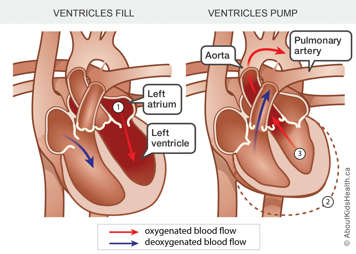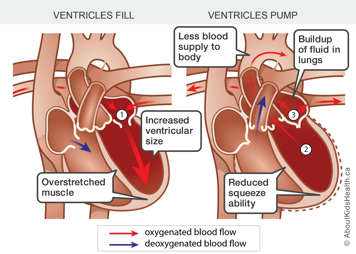

Dilated cardiomyopathy (DCM) is the most common type of cardiomyopathy in both children and adults. It is estimated that DCM occurs in 36.5 out of every 100,000 children. DCM may be underreported because it is often not detected.
In DCM, the heart muscle is weakened and becomes thinner and overstretched (dilated), increasing the size of the ventricular chamber. This reduces the ability of the heart to contract (pump). In severe cases, this results in not enough blood circulating to the body. When the ventricles do not squeeze the blood out of the heart, fluid can back up into the lungs.
DCM may result in abnormal heart rhythms (arrhythmias) because the heart’s electrical signal is not conducted properly through the overstretched muscle.
In some cases, the kidneys respond to the decreased heart function by retaining fluid and sodium. The fluid and sodium can build up in the legs, ankles, feet, lungs and other organs.
What is cardiomyopathy
Cardiomyopathy is a disorder affecting the heart muscle. The heart may have a normal structure but there are problems in the way it develops or functions. Cardiomyopathy usually results in the heart being unable to pump properly, also known as heart failure.
Cardiomyopathy can be caused by a number of factors, including infections, conditions affecting the body’s metabolism and genetics.
There are several different types of cardiomyopathy. The four main types are:
- hypertrophic cardiomyopathy (HCM)
- dilated cardiomyopathy (DCM)
- restrictive cardiomyopathy (RCM)
-
arrhythmogenic right ventricular cardiomyopathy (ARVC).
Symptoms of DCM in babies and children
Children with DCM may only have a few of the following symptoms. In some cases, the cardiomyopathy may be very advanced and children will show signs of end-stage heart failure and shock.
Symptoms of DCM are often similar to those of congestive heart failure, including:
- shortness of breath
- tiring easily
- difficulty tolerating physical exertion, such as exercise
- fainting
- sweating while resting
- sudden death (less common)
In many cases, the heart will also increase in size and the liver can enlarge.
DCM can cause symptoms in babies and young children such as:
- difficulty breathing
- puffiness
- poor appetite
- difficulty feeding
DCM can also occur without any symptoms until the heart becomes very weak.
Causes of DCM
Dilated cardiomyopathy can be passed down from parent to child. When dilated cardiomyopathy occurs through multiple generations in a family, it is called familial dilated cardiomyopathy. About 30% to 40% of cases of DCM are traced to genetic changes.
Treatment of DCM
Children with DCM may have to take medicine to remove extra fluid out of their body. These medications are called diuretics. Other medications are used to stabilize or improve the amount of work the heart has to do to pump blood. These medications are called angiotensin-converting enzyme (ACE) inhibitors.
Some children will also be given beta blockers. Beta blockers are medications that work by blocking the effects of the hormone epinephrine (adrenaline). They slow the heart down and cause it to beat more slowly and steadily.
Depending on your child's condition, other medications may also be necessary to help the heart pump better. These are typically given by intravenous (IV). Therapies to support feeding and CPAP (continuous positive airway pressure) may also be beneficial.
In some cases, other procedures like implantable cardiac defibrillators (ICD) and ventricular assist devices, which help support cardiac output, may be used.
In other cases, patients with DCM may require a heart transplant.